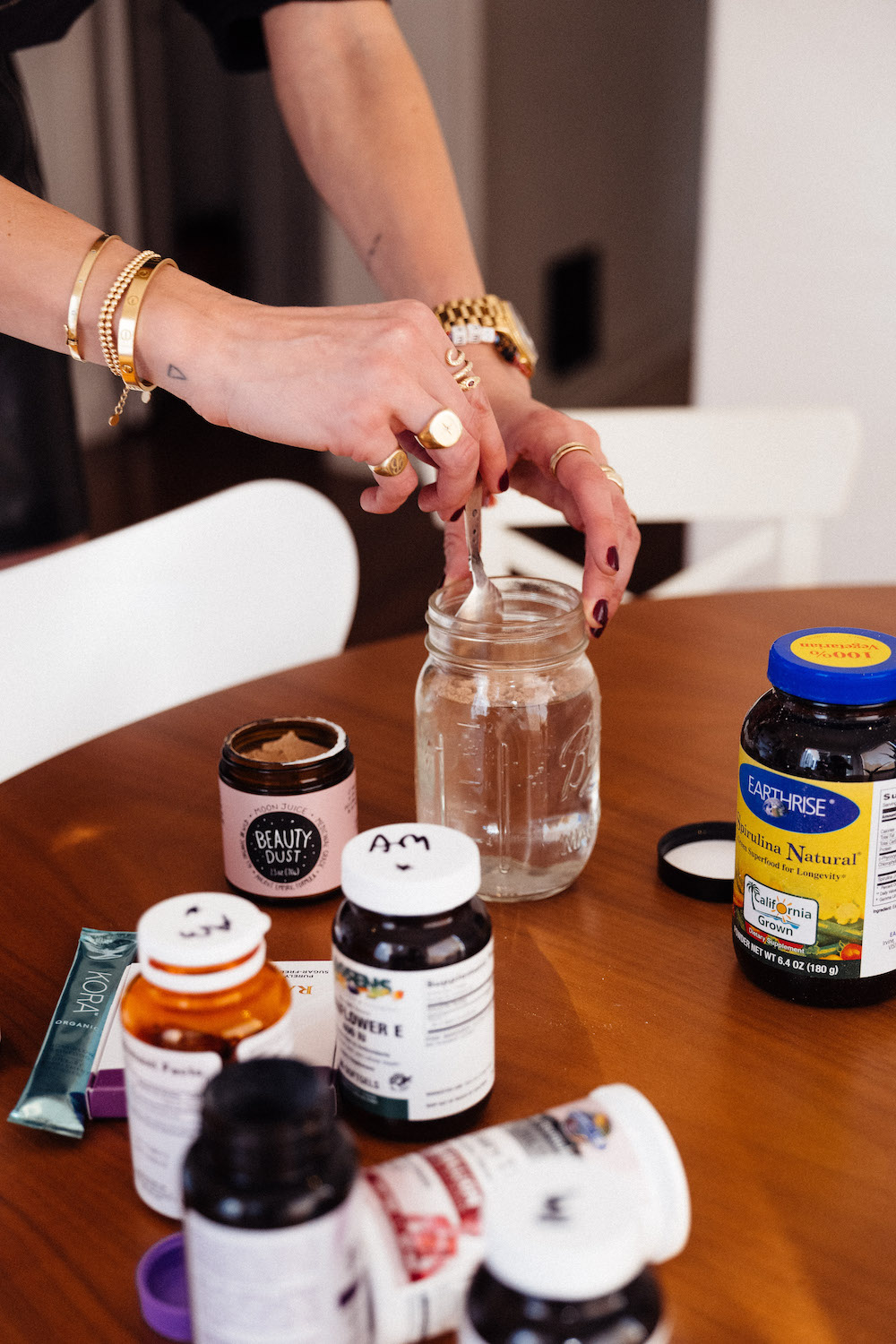Migraines, ugh. if this common affliction doesn’t affect you directly, you probably know one or many people who suffer from migraine headaches. This debilitating and painful condition is surprisingly common and disproportionately affects women over men. Up to 18% of women in the general population deal with migraines and headaches. Ouch! According to the Migraine Research Foundation, 12% of the total US population suffers from migraine – children included. That’s painfully impressive!
While there are many “abortive” medications that are meant to completely stop migraines once they have begun, there is also newer research supporting the use of supplements as a preventative measure. At the forefront of holistic and natural medicine we seek to solve the root cause of an issue rather than treat the issue once it has occurred.
I think of it as a conscious choice to support your health preventatively versus applying a bandaid that may leave you spinning in its aftermath.
If you suffer from migraines or know loved ones who do, investing your time and money in these supportive regimens are well worth it. Of course everyone is different and typically there is no ‘one cure suits all’ when it comes to headaches — different people have them for different reasons! However, if you’re tired of only using prescription medications after the headaches come on and want to dig deeper, it’s worth seeing if some or all of these supplements may give you relief.
Note: This information is not professional medical advice and if you have certain health conditions or take daily medications, you should ask your doctor about adding in these supplements on top of them. I do know however that everything I mention in this article is generally gentle, well tolerated and safe. Let’s dive in, head first perhaps?
featured image via beauty crew

Magnesium
How much: 500 mg / day
This naturally occurring earth element is one of my favorite supplements. Magnesium plays a vital role to interrupt and curb many of the pathways and root causes of migraines, and has been well studied and discussed over a long time in headache medicine. As a supplement, magnesium is also generally easy on the body, safe to use and has been proven to decrease the number of migraines people experience per month. Furthermore, in individuals who have tested positive for magnesium deficiency who were supplemented, over 86% experienced a decrease in symptoms and occurrence. This was the case for people suffering from migraines, menstrual migraines, cluster headaches and tension type headaches.
It’s not necessary to be tested for deficiency to begin supplementation and magnesium has also been proven to help people who aren’t deficient. Details aside, if you experience any kind of headache or migraine, it won’t hurt to supplement with magnesium to see if you may benefit from this excellent earth element.
One thing you to look out for when using magnesium is upset stomach and diarrhea (just sometimes)! There’s a way to get around it though – if you deal with loose stool, diarrhea or irritable bowel syndrome on a regular basis you should look to use Magnesium Glycinate at the health food store – this kind has less gastrointestinal side effects. On the flip side, if you deal with constipation regularly – use Magnesium Citrate, as this form will actually help both headaches and constipation. Ain’t nobody mad at that.
Other added benefits of magnesium include anxiety reduction and deeper sleep. Yes, yes, and yes – we’ll take it all.
This supplement is also totally safe for pregnancy, too.
B2 a.k.a Riboflavin
How much: 400 mg / day
Riboflavin is a b-vitamin that we obtain through our diet. You can find this vitamin in foods like lean meat, beans, eggs, nuts and green leafy vegetables. Taking high doses of riboflavin (much more than what you would obtain through a normal diet) also may be helpful for migraine prevention. While there has only been one research study done looking at the use of this vitamin and more research is needed, using riboflavin to see if it may help is low risk and has the added benefit of helping your hair skin and nails grow. Yass hunny.
The data from research done thus far shows promising results. In the one study looking at riboflavin supplementation for headache conditions – half of the individuals taking B2 experienced a 50% reduction in migraines. Half the headaches? Heck yes! Do note that most riboflavin supplements found in health food stores or online come in doses of 100 to 200 mg, so adjust the number of pills you take per day accordingly. Research has also shown that using riboflavin alongside magnesium and coq10 is especially helpful – so utilizing this trio (all mentioned in this article) is a great place to start.

CoQ10
How much: 300 mg / day
Coenzyme Q10 or CoQ10 is an antioxidant produced naturally in the human body that our cells use for growth and maintenance. As we age we produce less CoQ10 over time. Why do we care about CoQ10? It’s involved in the creation of something called adenosine triphosphate (ATP), which is what feeds every cell in the human body energy. Nom Nom Nom. Our cells need ATP to function properly and help us thrive. What does coq10 do to help migraines? Easy! A cascade of reactions within your body that have to do with a peptide called CGRP are thought to cause migraines in the first place – and simply put Coq10 can offset this chain of reactions that trigger headache disorders in the first place.
It’s all about prevention!
Research has shown that even in huge doses CoQ10 is totally safe (not that you need a huge dose) – and as we age it helps with heart health too! That’s a win win my friends. Again, in research the use of CoQ10 alongside B2 and Magnesium supplementation decreased the frequency and severity of migraines in test subjects by over 50%. Throw this one in the cart mis amigos. It really can only help.

Omega 3 Fatty Acid / Fish Oil / DHA / EPA
How much: 1,000-2,000 mg / day
Omegas are all the rage these days. What exactly are they and why though!? We’ll dig into the ‘why’ in a moment – as for what – fish oil capsules are healthy fats derived from fish containing Eicosapentaenoic acid (EPA) and Docosahexaenoic acid (DHA) which are classified as omega-3 fatty acids. These fatty acids are found plentifully in salmon and other fish and in flaxseed.
Every time I turn around it seems that fish oil supplementation can be used to support yet another medical condition. It’s no coincidence or quack attack though – the more we learn about healthy fats and omegas – the more we understand and realize their plentiful anti-inflammatory properties on the body.
According to The American Heart Association, omega 3 fatty acids also “supercharge macrophages, [which are] specialized cells that destroy bacteria and eliminate dead cells. They also make platelets less sticky, potentially decreasing the formation of blood clots. The molecules also have been shown to play a role in tissue regeneration.” In a study on migraine and omega 3 fatty acids, fish oil was found to decrease the intensity of headaches by close to 50% and the severity of migraines by upwards of 70%. Yas! In a study on 15 participants – 9 found significant migraine relief from fish oil supplementation. If you want to check out a brand I love that doesn’t smell or taste fishy click here. Keep those healthy fats bumpin ya’ll.

Probiotics
How much: 1 / day
If you don’t know about the gut brain axis yet – check. it. out! It’s soooo fascinating and once you understand this concept – a daily probiotic makes perfect sense to help with any kind of brain related concerns (mental health included). Emerging research looks super promising that probiotics and healthy gut bacteria may be an important link missing in migraineurs (people who suffer from migraines). How so? Our guts have a nervous system all of their own that is directly connected to our central nervous system (and brain). Hence, happy gut = happy brain and vice versa. They’re always talking! Support that connection by adding some healthy bacteria to strengthen and protect your gut on the daily. To read more about the brain gut connection and why probiotics are important check out this article.

Vitamin D
How much: 5,000 IUI / day (more or less may be needed depending on your levels)
New research around Vitamin D and headache disorders is on the rise and the results are pretty stunning! I feel personally really pumped up about sharing the connection between curing or relieving headache conditions and vitamin D supplementation because I myself just found amazing relief from cluster headaches using this regimen. A plethora of studies have shown a connection between low to low-normal vitamin D levels and migraines and headaches. The fix?
Get your vitamin D levels pumped up to higher than normal, somewhere between 50-100 ng/mL and you may set yourself up to have an 80–83% lower chance of migraine headache. Thats huge.
You can check your vitamin D levels by going to a primary care provider and discussing your plan for supplementation or may even be able to order your own labs at facilities like this (which may not be covered by insurance) and it’s not rocket science to do this yourself. Take control of your health! Adjust supplementation between 2,000 and 6,000 IUI / day until your levels are hanging out between 50-100 ng/mL. Then sit back and enjoy the *hopeful* benefits! Bonus points: Vitamin D supplementation has also been shown to improve mood, anxiety and bone health.

Last Tip!
Anyone who deals with headaches or migraines should consider keeping a diary of what’s going on in your noggin. A headache diary is a simple tool to track all painful events over time to help understand why and what triggers headaches and migraines – as well as what may help!
Just a quick jot in your log on days when you have headaches and any triggers you may have eaten or been exposed to is a good start. Here’s a link to Stanford Med’s education on headache diaries with tons of suggestions and tips. An easy to use app if you prefer technology over paper and pen is called migraine buddy, you can find more suggestions in the above Stanford link too! Best of luck, chronic migraines and headaches can be disabling and traumatizing -I know from experience and I hope you find some helpful information within this article. I wish the happiest of heads to each of you. XO.






